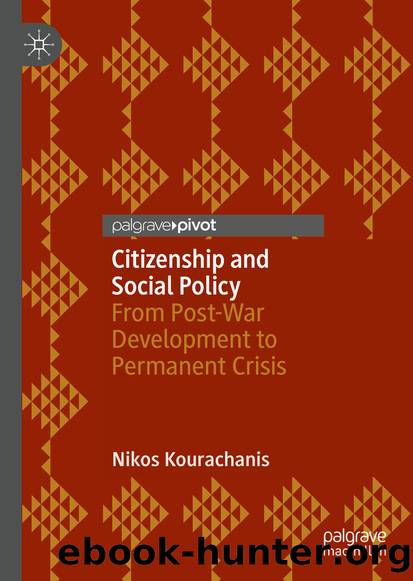Citizenship and Social Policy by Nikos Kourachanis

Author:Nikos Kourachanis
Language: eng
Format: epub
ISBN: 9783030598273
Publisher: Springer International Publishing
4.4 Interpretations of the Development of the Active Welfare State
The crisis of the Keynesian welfare state and its succession by the active/ neoliberal welfare state coincided with structural shifts in the philosophy and spirit of citizenship and social policy. These developments have been interpreted by different schools of thought through the application of their own scientific tools. Three different interpretative approaches will be discussed below: the approach to post-industrial society and the new social risks; the new institutional approach; and later versions of power resources theory with an emphasis on the role of enterprises.
A large body of interpretations comes from scholars who argue that social policy restructuring is due to the economic, political, social and cultural developments that took place after the early postwar decades. These developments have led to post-industrial society and the emergence of new social risks arising from it. According to Taylor-Gooby (2004: 2), new social risks are the risks that people face today during their lives as a result of the economic and social changes associated with the transition to a post-industrial society.
The dynamics of globalization and the transition from an industrial to a post-industrial society, widespread changes in family structure and gender relations, but also the long period of economic recession, high unemployment and the transition to an aging demographic trend have created a very different climate from that of the early postwar decades. This interpretation holds that since the 1980s it is not only significant cuts in the social spending of welfare states that can be observed, but structural rearrangements are also taking place, to adapt to the range of new social risks (Myles and Quadagno 2002).
The process of economic globalization is seen as a structural parameter that changes the profile of the postwar welfare state. The internationalization of the economy strengthens the negotiating power of world capital, thereby overturning the equilibrium of the postwar trade union consensus (Carnoy et al. 1993). Economic elites are more likely to move their businesses to countries that are more economically profitable due to lower taxation, lower wage costs or limited social policies (Mishra 1999) and the main victims of this development are national social protection systems, which are at risk of social dumping (Bernaciak 2012).
A second interpretation of the new social risks is the process of the transition from an industrial to a post-industrial society. The structural transformations that have occurred in manufacturing processes with the shift from manufacturing industry to the tertiary service sector have contributed significantly to the restructuring of the welfare state (Gilbert et al. 1992).
This transition is also accompanied by a reduction in blue collar workers and, by extension, a weakening of the labor movement. The political role of trade unions and workersâ claims were important parameters for the social conquests that were founded on the concept of social citizenship. Consequently, the weakening of the trade unions has led to a reduction in the decommodified benefits that were based on the industrial citizen model (Jensen and Pfau-Effinger 2005). This was aided by the introduction of flexibility as a key feature of the new way of organizing work (Gilbert et al.
Download
This site does not store any files on its server. We only index and link to content provided by other sites. Please contact the content providers to delete copyright contents if any and email us, we'll remove relevant links or contents immediately.
Cecilia; Or, Memoirs of an Heiress — Volume 1 by Fanny Burney(31356)
Cecilia; Or, Memoirs of an Heiress — Volume 3 by Fanny Burney(30954)
Cecilia; Or, Memoirs of an Heiress — Volume 2 by Fanny Burney(30909)
The Great Music City by Andrea Baker(21784)
We're Going to Need More Wine by Gabrielle Union(18090)
Bombshells: Glamour Girls of a Lifetime by Sullivan Steve(13122)
Pimp by Iceberg Slim(12953)
All the Missing Girls by Megan Miranda(12786)
Fifty Shades Freed by E L James(12467)
Talking to Strangers by Malcolm Gladwell(11919)
Norse Mythology by Gaiman Neil(11910)
Crazy Rich Asians by Kevin Kwan(8378)
Mindhunter: Inside the FBI's Elite Serial Crime Unit by John E. Douglas & Mark Olshaker(7854)
The Lost Art of Listening by Michael P. Nichols(6492)
Enlightenment Now: The Case for Reason, Science, Humanism, and Progress by Steven Pinker(6419)
Bad Blood by John Carreyrou(5785)
The Four Agreements by Don Miguel Ruiz(5536)
Weapons of Math Destruction by Cathy O'Neil(5056)
We Need to Talk by Celeste Headlee(4888)
